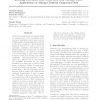Free Online Productivity Tools
i2Speak
i2Symbol
i2OCR
iTex2Img
iWeb2Print
iWeb2Shot
i2Type
iPdf2Split
iPdf2Merge
i2Bopomofo
i2Arabic
i2Style
i2Image
i2PDF
iLatex2Rtf
Sci2ools
ICML
2004
IEEE
2004
IEEE
Learning first-order rules from data with multiple parts: applications on mining chemical compound data
Inductive learning of first-order theory based on examples has serious bottleneck in the enormous hypothesis search space needed, making existing learning approaches perform poorly when compared to the propositional approach. Moreover, in order to choose the appropiate candidates, all Inductive Logic Programming (ILP) systems only use quantitive information, e.g. number of examples covered and length of rules, which is insufficient for search space having many similar candidates. This paper introduces a novel approach to improve ILP by incorporating the qualitative information into the search heuristics by focusing only on a kind of data where one instance consists of several parts, as well as relations among parts. This approach aims to find the hypothesis describing each class by using both individual and relational characteristics of parts of examples. This kind of data can be found in various domains, especially in representing chemical compound structure. Each compound is compose...
Enormous Hypothesis Search | ICML 2004 | Inductive Logic Programming | Machine Learning | Ten-fold Cross Validation |
Related Content
| Added | 17 Nov 2009 |
| Updated | 17 Nov 2009 |
| Type | Conference |
| Year | 2004 |
| Where | ICML |
| Authors | Cholwich Nattee, Sukree Sinthupinyo, Masayuki Numao, Takashi Okada |
Comments (0)

